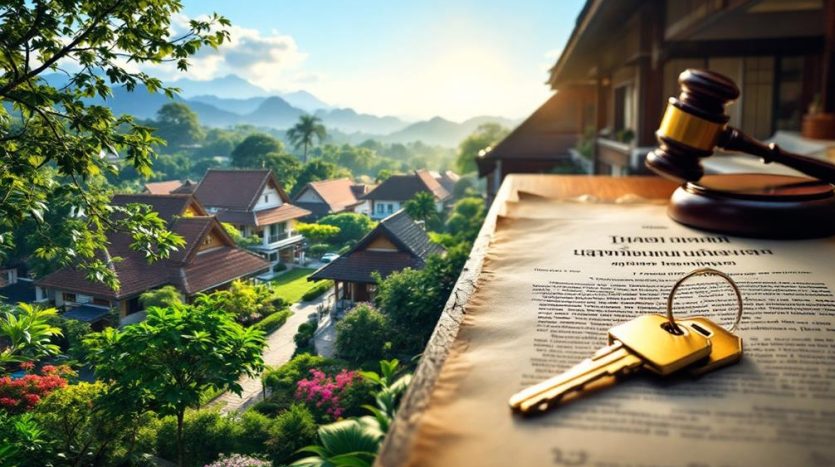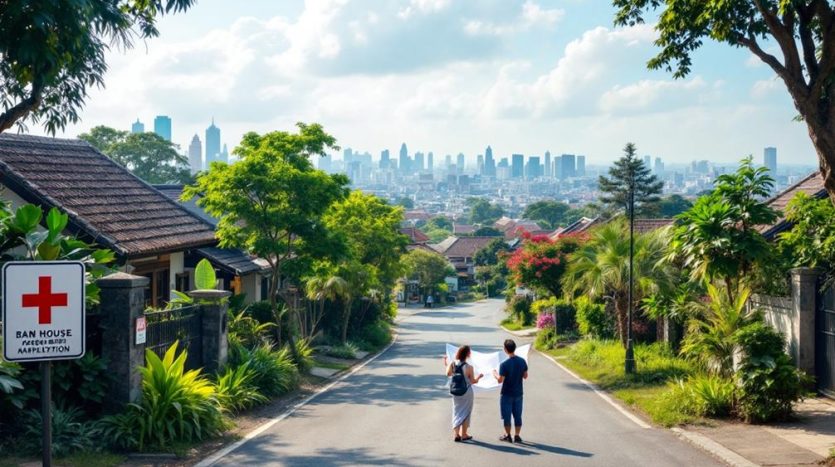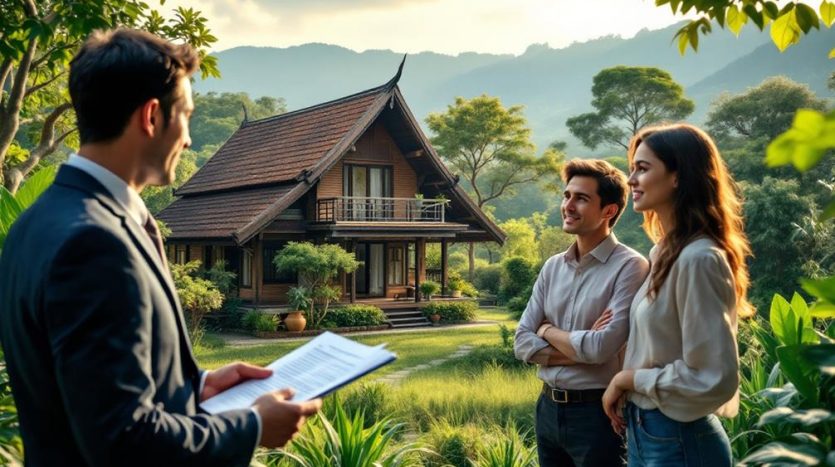Can I Get Residency in Thailand if I Buy a House?
Considering a move to Thailand and thinking that buying a house might secure your residency? It's not as straightforward as it seems. While you can certainly own a house, the intricacies of Thai property laws and foreign ownership restrictions mean that owning land is a different story. You'll need to explore other avenues, like the Thailand Elite Visa or the Investment Visa, which involve different commitments. So how do these options stack up, and what should you be aware of before taking the plunge? Let's explore the paths that could turn your Thai dream into reality.
Key Takeaways
- Buying a house in Thailand does not automatically grant residency or citizenship.
- Foreigners can own houses but not the land; land ownership is restricted.
- Property ownership must align with investment opportunities for potential visa qualifications.
- The Thailand Elite Visa offers long-term residency but requires a membership fee, not property ownership.
- Financial stability and income verification are crucial for residency applications in Thailand.
Understanding Thai Property Laws
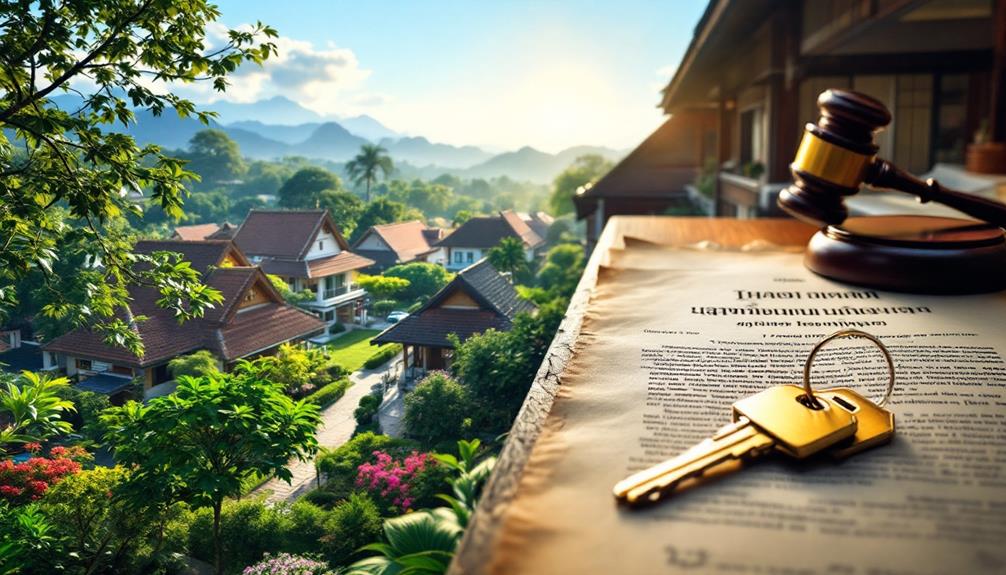
When you're considering purchasing property in Thailand, understanding the country's property laws is essential. You might think it's just about signing on the dotted line, but oh, there's so much more. Let's explore the nitty-gritty of property taxes and ownership rights, shall we?
First off, property taxes in Thailand aren't going to make you cry into your Tom Yum soup, but you do need to know your obligations. They primarily consist of a transfer fee, a stamp duty, and possibly a specific business tax or withholding tax, depending on whether the seller is an individual or company. It's like a surprise party for your wallet, minus the confetti.
Now, let's chat about ownership rights. As a foreigner, you can't own land directly in Thailand—it's not you, it's them. But don't throw in the towel just yet. You can own structures like houses; just make sure you've got a leasehold agreement or a Thai partner.
You might consider foreign ownership strategies, which include leasehold agreements or investment through a Thai Limited Company. Maneuvering through these laws can feel like trying to dance in a phone booth, but with the right legal advice, you'll be doing the cha-cha in no time.
Types of Property Ownership
When considering property ownership in Thailand, you'll need to understand the distinctions between freehold and leasehold arrangements.
Foreign nationals can hold a freehold title to condominiums, subject to specific foreign ownership quotas, but can't directly own land.
Alternatively, a leasehold agreement allows you to lease land or property for up to 30 years, with options for renewal, offering a viable path to secure long-term residency.
It's also essential to be aware of local rental laws, as they'll affect your ability to rent or lease property.
Understanding these laws will help avoid legal pitfalls and guarantee a smooth property acquisition process.
Freehold vs. Leasehold
Understanding the distinction between freehold and leasehold property ownership in Thailand is essential if you're considering buying a house there.
Freehold ownership allows you to own the property outright, complete with all the glorious property rights one dreams of. However, here's the catch: as a foreigner, you can't own land on a freehold basis. So, unless you're about to marry a Thai national, your dreams of freehold ownership might remain just that—dreams.
Leasehold, on the other hand, is your go-to option. You can lease land for up to 30 years, with the possibility of renewing the lease twice, totaling 90 years. It's like a long-term relationship with an expiration date.
Ownership risks include the owner deciding not to renew your lease, which could leave you scrambling faster than you can say "Sawadee."
Although leasehold doesn't give you full ownership rights, it does let you enjoy the perks of living in Thailand without breaking legal boundaries.
Just remember, always have a legally sound lease agreement crafted. It mightn't be a lifetime commitment, but hey, nothing says "I love this country" like a 90-year lease!
Condominium Ownership Rules
Condominium ownership in Thailand offers a viable path for foreigners seeking property rights without the complexities of land ownership restrictions. You're in luck because you can own up to 49% of a building's total area as a foreigner. It's like having your cake and eating it too, minus the land. Condo management, however, may feel like herding cats, but it's essential for maintaining your investment.
Here's a quick cheat sheet:
| Topic | Details | Note |
|---|---|---|
| Ownership Rights | 49% foreign quota | Verify the project complies with this. |
| Land Ownership | Not included | Focus on the condo unit itself. |
| Condo Management | Handles maintenance, security, etc. | Fees apply—no free lunches here. |
| Legal Compliance | Must follow Condominium Act | Ignorance isn't bliss, read the Act. |
| Transfer Process | Requires land office registration | Don't skip this; it's not optional. |
Foreign Ownership Restrictions
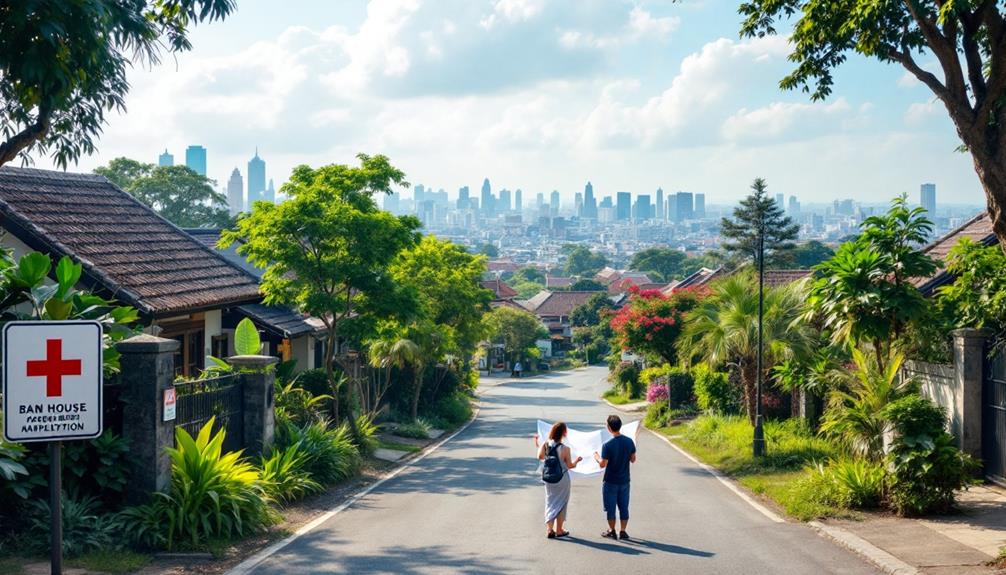
Due to specific regulations in Thailand, foreign ownership of land is generally restricted, which directly impacts your ability to own a house outright.
You're probably thinking, "But I just want to sip coconut water in my Thai garden!" Sorry to burst your bubble, but property regulations are quite strict. Foreign investment in land is fundamentally a no-go. While you can own the house itself, the land it's built on must remain in Thai hands.
It's like owning the toppings but not the pizza. This is especially significant in urban areas like Bangkok, where the demand for property is high, making it even more challenging for foreigners to maneuver ownership.
Now, don't lose hope just yet! There are still ways to navigate these restrictions. You can lease the land for up to 30 years with options to renew. Consider it a long-term rental with VIP perks.
Alternatively, you might invest in a Thai company that owns the land, though this route requires navigating complex corporate laws and hefty paperwork—time to put on your business tycoon hat!
Residency and Real Estate
Maneuvering the complex landscape of foreign property ownership in Thailand might seem intimidating, but it opens a gateway to a unique residency opportunity. While you can't directly buy your way into Thai citizenship by snapping up a beachside villa, the property market does offer some enticing legal bridges—like a well-placed hammock under a palm tree.
To navigate these waters, first, grasp the residency requirements. Spoiler alert: these requirements don't automatically roll out the welcome mat just because you own a home. It's vital to recognize that regional cost variations can impact your investment decisions, as urban areas tend to be pricier than rural ones.
You can, however, gain residency via other indirect paths. Consider properties that align with investment opportunities, which could qualify you for long-term visas. Owning a condo can contribute to your eligibility, but not directly hand you a residency card. It's like buying a ticket to a concert, but you still need to know the exact entrance to use.
The property market, while not a direct route to residency, can still play a role in your overall residency strategy. Think of it as a supporting actor in your Thai drama, not the lead.
Just remember, even in the Land of Smiles, it's important to keep your legal ducks in a row.
Investment Visa Options

When considering residency in Thailand through property acquisition, you should evaluate the Thailand Elite Visa as a viable investment option.
This visa provides long-term residency benefits, including a renewable membership that can last up to 20 years, without requiring a work permit.
Additionally, investing in property may offer financial advantages, such as potential capital appreciation and rental income, enhancing your investment portfolio.
Thailand Elite Visa
With the Thailand Elite Visa, you gain residency benefits that are as attractive as a sunset on a Thai beach.
You'll enjoy expedited immigration procedures, access to exclusive airport lounges, and even a personal concierge service.
It's not just about fancy perks, though. The visa allows you to stay in Thailand long-term, ensuring that your dreams of sipping coconut water on a weekday afternoon can become a reality.
The program requires an upfront fee, starting around THB 600,000 (approximately USD 17,000), which isn't pocket change, but think of it as an investment in your future happiness.
Property Investment Benefits
While the Thailand Elite Visa offers a luxurious path to residency, another compelling route involves property investment.
Imagine diving into the world of tax advantages and market stability while sipping coconut water on your new beachfront property. By investing in Thai real estate, you're not just buying a home; you're securing potential rental income. Who wouldn't want tenants funding their mango sticky rice obsession?
Property appreciation is another perk. As Thailand's economy grows, so does the value of your investment. It's like watching your soufflé rise in the oven, except this one pays for your retirement planning.
Speaking of planning, what's more delightful than diversifying your investment portfolio with a Thai twist?
Lifestyle enhancement is part and parcel of this journey. Picture yourself absorbing the local culture, participating in vibrant festivals, and perhaps mastering the art of the Thai smile.
You'll enjoy cultural immersion while your investment matures gracefully. It's a win-win!
Thailand Elite Visa Program
Thailand's unique Thailand Elite Visa Program offers a convenient pathway to long-term residency for foreign nationals seeking to reside in the country.
Think of it as your golden ticket to the Land of Smiles without the hassle of annual visa renewals.
Here's what you need to know about the elite visa benefits and application process:
1. Elite Visa Benefits: Enjoy perks like expedited immigration services, access to exclusive airport lounges, and discounts at luxury hotels.
It's like being treated as a VIP every time you step into Thailand.
2. Application Process: Submit your application through the Thailand Elite website.
You'll need a valid passport, a clean criminal record, and, of course, a willingness to part with some cash.
Think of it as an investment in a future filled with pad thai and beautiful beaches.
3. Membership Packages: Choose from several packages, each varying in duration and benefits.
Whether you want a five-year or a twenty-year plan, there's something for everyone, unless you're a spy—then, sorry.
4. Cost: Be prepared to shell out anywhere from 500,000 to 2 million Thai Baht.
If your wallet's still smiling, you're ready to go.
Long-Term Residency Pathways

To secure long-term residency in Thailand, you can explore options such as the Elite Visa Program and the Investment Visa Option.
The Elite Visa offers a range of membership tiers with varying benefits and durations, requiring substantial financial commitment.
Alternatively, the Investment Visa demands a significant investment in qualifying Thai assets, providing a pathway to extended residency.
Elite Visa Program
For individuals seeking a long-term residency solution in Thailand, the Elite Visa Program offers a unique pathway through a membership-based scheme.
Imagine having a front-row seat to paradise without the hassle of constant visa renewals. The Elite visa doesn't just promise Thailand residency; it practically rolls out a red carpet for you!
Here's how it works:
- Membership Tiers: Choose from various packages ranging from five-year to twenty-year arrangements. Whether you're a short-term planner or a long-haul visionary, there's a tier for you.
- Exclusive Perks: Enjoy benefits like airport VIP services, annual health check-ups, and spa treatments. You'll feel like James Bond, minus the espionage.
- No Work Permit: Sorry, you can't work in Thailand on this visa. But who needs a nine-to-five when your office can be a hammock on a pristine beach?
- Investment-free: Unlike some visas, you don't need to invest in property or businesses to qualify. Just pay your membership fee and voilà, you're in!
In the landscape of Thai visas, the Elite Visa is like finding a hidden treasure—complete with coconuts and sunsets.
Embrace the good life, my friend!
Investment Visa Option
While the Elite Visa Program offers a luxurious and hassle-free entry into Thai residency, the Investment Visa Option provides an alternative pathway for those looking to anchor themselves more permanently in the country.
Now, don't pack your bags just yet—this isn't your typical real estate adventure where you buy a fixer-upper and become a Thai local overnight. The Investment Visa requires a substantial financial investment in the domain of 10 million Thai Baht. That's approximately the price of a small island, or at least a really nice condo with an ocean view.
But let's get serious. You'll need to invest in government-approved assets, like real estate, bonds, or shares in Thai companies. Think of it as your ticket to the Thai residency club—without the velvet rope but with plenty of legal stipulations.
The Thai government isn't just handing out visas because you've got a wallet full of Baht. You've got to show them the money, and in specific forms.
In essence, this visa is perfect for those who see their financial investment as not just a transaction, but a commitment to a tropical lifestyle.
Just remember, with great homes come great responsibilities—and paperwork.
Financial Requirements for Residency
When considering residency in Thailand through property investment, understanding the financial requirements is vital. You've got to prove your financial stability, which sounds like the grown-up version of showing off your piggy bank savings—only with a lot more paperwork.
Yes, your dream of sipping coconut water by the beach requires a solid financial ground.
Here's a handy checklist to get you through this process with minimal hair-pulling:
- Income Verification: Make certain you can verify your income. The Thai authorities will want to see that you're not just living off the generosity of a rich uncle or a mysterious benefactor.
- Bank Deposits: Guarantee a minimum balance in a Thai bank account. Think of it as a security deposit for your future tropical lifestyle.
- Proof of Financial Stability: Demonstrate your financial stability through bank statements, investment portfolios, or other assets. It's like show and tell, but with less glitter and more spreadsheets.
- Regular Income: Show proof of regular income, because let's face it, the coconuts aren't free.
Navigating financial requirements might seem as fun as watching paint dry, but it's a vital step towards calling Thailand home.
Legal Assistance and Advice
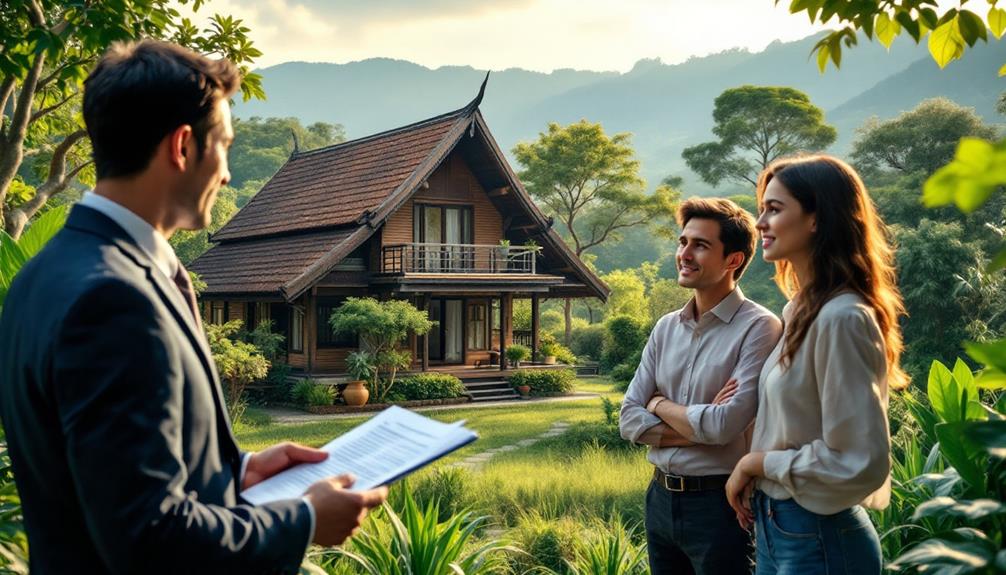
Maneuvering the legal landscape of obtaining residency in Thailand through property investment requires meticulous attention to detail and professional guidance. You might feel tempted to dive headfirst into this adventure, but without a trusty legal consultation, you could end up swimming in a sea of paperwork—possibly with a few sharks, a.k.a. property disputes, lurking nearby. A well-versed legal expert will help you navigate these waters, guaranteeing you don't end up buying a phantom house or worse, a lifetime of regret.
To keep things crystal clear, here's a handy table:
| Step | Description | Importance |
|---|---|---|
| Legal Consultation | Hire a lawyer specializing in Thai property laws. | Avoids costly mistakes. |
| Property Title Search | Verify the authenticity of the title. | Prevents ownership disputes. |
| Contract Examination | Verify terms are fair and legal. | Safeguards your interests. |
| Compliance Verification | Check adherence to Thai laws. | Avoids legal complications. |
| Dispute Resolution | Settle any property disputes early. | Saves time and stress. |
Engaging a seasoned legal consultant isn't just smart—it's essential. They'll translate the Thai legalese that might otherwise send you into a tailspin. Remember, when it comes to property and residency, ignorance isn't bliss; it's potentially expensive. So, lawyer up and let them do their magic!
Common Mistakes to Avoid
In the quest to secure residency in Thailand by purchasing property, many potential pitfalls can be avoided with careful preparation.
Let's explore a few common mistakes that could disrupt your tropical dreams faster than a surprise monsoon.
1. Neglecting Financial Planning: Don't let your budget blow away like a beach umbrella in a storm.
Make sure you understand all costs involved, including taxes, maintenance, and unexpected fees. Assess your financial situation thoroughly to avoid being cash-strapped later.
2. Ignoring Legal Requirements: Thailand's property laws can be as tricky as a tuk-tuk ride in Bangkok traffic.
Always verify that the property purchase aligns with legal stipulations and doesn't automatically grant residency. Consult a lawyer, unless you enjoy legal puzzles.
3. Overlooking Cultural Integration: Buying a house is one thing; fitting in is another.
Embrace cultural integration by learning the language and customs. Otherwise, you might find yourself the unwitting star of a local comedy show.
4. Underestimating Market Research: Don't skip homework on the property market.
Understanding location, value trends, and neighborhood dynamics will help you avoid investing in a house that's as popular as a spicy dish without ice water.
Avoid these pitfalls, and you'll be one step closer to a successful Thai residency journey!
Benefits of Thai Residency

Securing property in Thailand without falling into common pitfalls sets you up for enjoying the numerous advantages of Thai residency. Ever dreamt of affordable healthcare access while sipping a coconut on the beach? You're in luck! Thailand offers quality medical services that won't break the bank. With Thai residency, cultural integration becomes smoother. You'll be engaging in wai greetings like a pro in no time.
| Benefit | Description | Why it Matters |
|---|---|---|
| Healthcare Access | Affordable and quality medical services | Cost-effective well-being |
| Cultural Integration | Easier assimilation into Thai customs | Enriching personal experience |
| Social Benefits | Access to local services and discounts | Enhanced community involvement |
| Tax Implications | Potential tax advantages for residents | Financial savings |
Thinking about retirement planning? Thailand's lifestyle advantages are ideal for retirees. From beautiful beaches to lively urban centers, your golden years can be both relaxing and exciting. Educational opportunities abound, too, with international schools ready to nurture young minds. Don't forget the social benefits and community engagement—being part of a vibrant expat community adds another layer of fulfillment. So, if you're considering a tropical adventure with all these perks, Thai residency might just be your golden ticket!
Alternative Residency Options
Exploring alternative residency options in Thailand offers you a variety of pathways to establish your home in this vibrant country.
Whether you're ready to embrace the laid-back lifestyle of a retiree or juggle work assignments like a digital nomad, Thailand's got you covered.
Let's delve into the nitty-gritty of these options:
1. Retirement Visa: If you've hit the glorious age of 50, congratulations! You can apply for a retirement visa.
With a cool 800,000 THB in your Thai bank account or a monthly income of 65,000 THB, you can sip coconuts on the beach without a care in the world.
2. Digital Nomad Visa: Love working in your pajamas? Thailand's Smart Visa might be your new best friend.
It offers a one-year stay if you're a digital nomad with a job that meets specific criteria, like earning at least $2,000 a month.
3. Marriage Visa: Tying the knot with a Thai citizen? You're eligible for a marriage visa, allowing you to stay long-term with your beloved.
4. Investment Visa: If you've got a spare 10 million THB, invest it in Thailand and enjoy a one-year residency.
There you have it, legal pathways sprinkled with a touch of humor!

